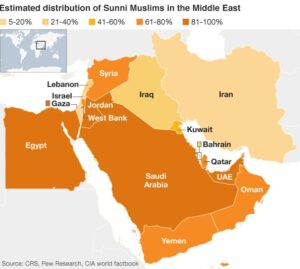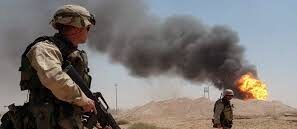US Invasion of Iraq
The US-led invasion of Iraq in 2003 led to many unintended consequences such as a rise in extremism and a shift in power dynamics within the MENA region. In the lead-up to the US invasion, the United States government started to create a narrative about the Iraqi state that it was 1) connected to Al-Qaeda and the 9/11 attacks and 2) despite UN sanctions and inspections, the state had an active weapons program. These accusations were largely inaccurate. It was concluded that in the 9/11 attacks, there was no collaboration between Al-Qeda and Iraq. After more investigation, it was also concluded that there were no active weapons programs in Iraq, however, the United States continued its narrative that Iraq was an international security threat and continued through with its plan to invade Iraq.
 Rise of Extremism and Regional Politics
Rise of Extremism and Regional Politics
The invasion successfully removed Saddam Hussein and his regime from Iraq and tried to institute a more democratic republic. The absence of Saddam Hussein created an opening for extremist groups to establish themselves in the absence of a strong, authoritarian leader. Extremist groups had the opportunity to exploit the instability of Iraq by expanding their influence. This allowed extremist groups like Al-Qaeda in Iraq (AQI) which evolved into the Islamic State of Iraq and Syria (ISIS) to gain a foothold in the country that they didn’t have with Hussein in power. The invasion also intensified the tensions between Sunni and Shia Muslims in Iraq. When the US invasion disbanded the Iraqi army and expelled the Ba’ath party from government positions, this affected the Sunnis who had been favored under Hussein. This fueled Sunni support for extremist groups.
The rise of extremism in Iraq had regional consequences because it led to an increase in terrorist attacks against US forces and Iraqi civilians. These attacks even further destabilize the region after the loss of power like Hussein, spreading instability across the region to states like Syria, Lebanon, and Jordan. Sunni communities felt marginalized by the new Shia government which fueled the environment of fear and resentment that extremist groups thrive off of. This resulted in a rise of threats to Shia communities by these newly powerful extremist groups.
Why Does This Matter?
The outcomes of the 2003 invasion of Iraq are significant because they had a lasting impact on the region. ISIS is a known terrorist organization that is responsible for attacks on civilians, mass killings, enslavement, and sexual violence (UN Security Council reports). The rise of extremist groups like ISIS was made possible through the US invasion and continues to pose a threat to global stability. Regional stability was affected by the removal of Saddam Hussein which gave an opening for the Shia-led government to fill the place of Hussein’s, Sunni, government. The power shift highlighted the sectarian divisions and resulted in an increase in violence between the two groups.
This instability was felt in surrounding countries where Saudi Arabia and Jordan were concerned about the rise in Shia power within Iraq and the possibility of them aligning with Iran, increasing Shia representation in the region. The rise of AGI (eventually ISIS) brought chaos and instability to Iraq and terrorism to surrounding countries. This is important because the invasion increased US military presence in the region which lasted for decades. Iranian influence also rose leading to regional distrust of the United States and its military strategies.
https://www.securitycouncilreport.org/un-documents/iraq/

Thank you for this post. I found it very interesting how you stated that even following the United States’ knowledge that Iraq had no weapons of mass destruction, the United States’ still believed Iraq was a security threat. Do you think the United States’ did this because they were unwilling to leave the country in order to preserve their reputation or was the United States making realistic security calculations?
While the possibility of WMDs was used to justify the invasion of Iraq, it seems that once the US was committed to the intervention, the need for further justification waned. Whether or not WMDs were present, it appears that the US was intent on remaining in Iraq. The desire to hold someone accountable for the 9/11 attacks may have played a role, as the invasion provided a sense of progress toward retribution. So, in a way, I think their decision to stay in Iraq regardless of WMDs, was to preserve their reputation as an untouchable force that 9/11 threatened.
Hi Morgan! Thank you for your blog post on the U.S. invasion of Iraq in 2003. First, I appreciated how in your introduction paragraph you mentioned the misperceptions and false accusations regarding the United States’ reason for the 2003 invasion. I think the biggest misperception is the U.S. intervened due to the 9/11 attacks, however, this was more applicable for invasion and subsequent war in Afghanistan, as Al-Qaeda was more prevalent in Afghanistan instead of Iraq at this time. Second, I enjoyed how you drew upon the identities of Iraq and the Hussein regime in formulating your response, specifically the divide of Sunnis and Shiite in Iraq and among outside actors in the conflict, such as Saudi Arabia and Jordan. Do you think identities played a critical role in the intervention of outside actors in Iraq? How do you think a constructivist would respond to the invasion of Iraq? Do you think identities or strategic interests had greater influence in the Iraqi conflict?
Hello, thank you for taking the time to read my post. I agree that identities played a role in the invasion of Iraq. President Bush framed the invasion of Iraq as a “War on Terror.” This narrative was rooted in American identity, influencing us to intervene with military force. A constructivist would focus on the invasion, as not being a result of strategic positioning, but rather, the Bush administration trying to eliminate the Iraqi regime because it posed an ideological threat. The simple name, “a war on terror” speaks for itself. We weren’t fighting a state, we were fighting an ideal and what could manifest from it.
Whether identities or strategic interests have a greater influence on the Iraqi conflict? It could go both ways, both played significant roles. Identities, national, regional, and religious, shaped perceptions and narratives that justified intervention. Strategic interests, such as access to oil, geopolitical positioning, the desire to spread democracy, and the possibility of Iraq possessing WMDs also played a crucial role.
Thank you for such a thought provoking blog post! I really enjoyed the section where you say “extremist groups had the opportunity to explote the instability in Iraq”. When I first read the prompt my mind went straight to other states and how they used the invasion to increase their power. Do you think extremist groups or other states benefited the most from the US invasion of Iraq
Thank you for your reply! The conflict is so complex that, in the long term, it is hard to tell whether non-state actors or states benefitted the most from the invasion. Iran stands out as the state that benefitted the most from the invasion due to its Shi’a majority. When Saddam’s Sunni regime was removed and Shi’a political influence rose, Iran gained some regional power. However, in the long term, I think that the invasion may have hurt states. The invasion opened up opportunities for extremist groups to rise and gain a foothold in the region. So, in that way, I think extremist groups may have relatively benefited more because they gained a platform that was out of reach before.